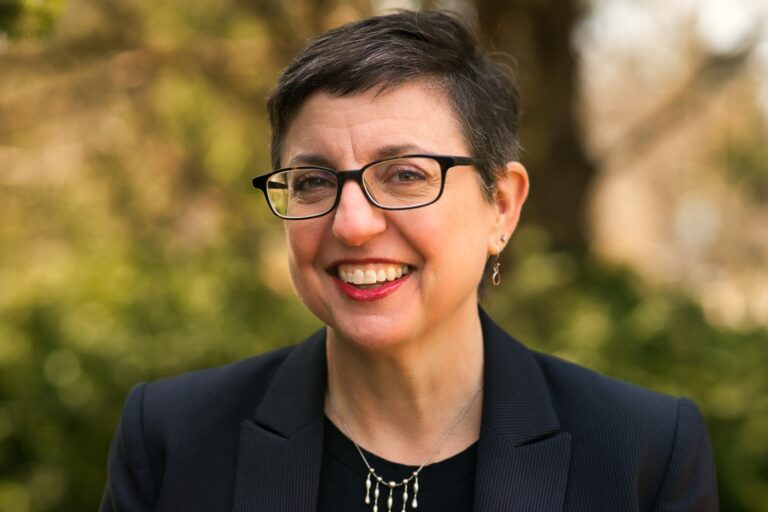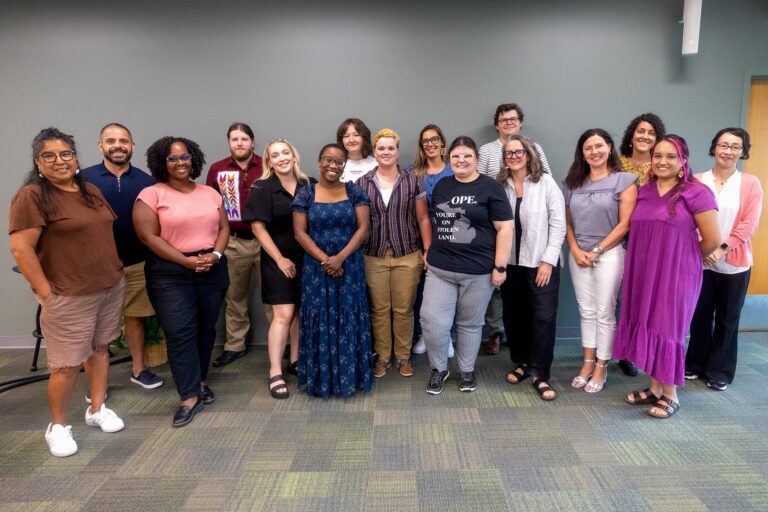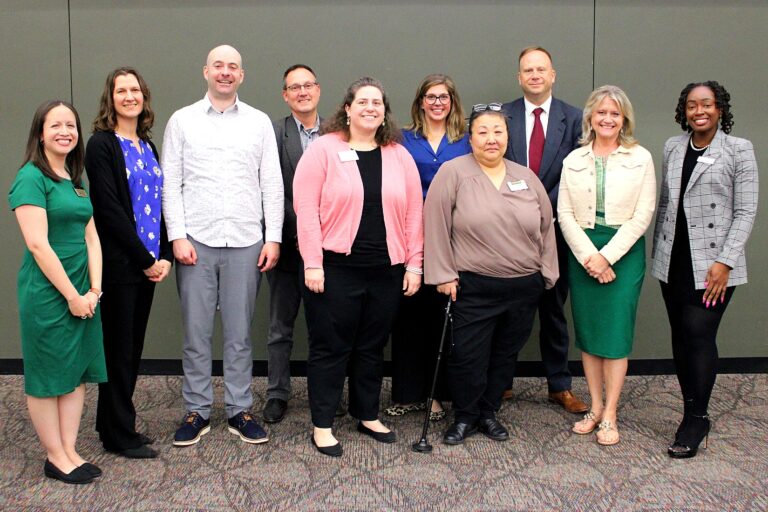As a high school English teacher in Detroit, April Baker-Bell says she felt ill-prepared to address her Black students’ language and literacy needs and found that she was not alone. This experience planted the seed from which her research took root and has been the driving force throughout her career.
Now an Assistant Professor in Michigan State University’s Department of English and the African American and African Studies program, Baker-Bell’s language and literacy work has earned her the 2018 Language and Social Processes (LSP) Early Career Scholar Award, an international award presented to one individual each year by the LSP special interest group of the American Educational Research Association (AERA).
“I am honored to have been selected for this award because the LSP SIG is really at the bedrock for advancing the field’s knowledge and pointing to new directions and future developments in issues of language literacy, discourse practices, and social processes research,” said Baker-Bell, who earned her Ph.D. in Writing and Rhetoric from MSU in 2014. “Receiving this award highlights the potential of my research to push the boundaries of the field of education to be more inclusive of linguistically and racially diverse communities.”
Baker-Bell received the Early Career Scholar Award on April 16 at the annual American Educational Research Association conference in New York City.
Research Takes Root in Detroit
Baker-Bell began her career teaching at a charter school on the east side of Detroit and later taught at Detroit Public Schools.
Receiving this award highlights the potential of my research to push the boundaries of the field of education to be more inclusive of linguistically and racially diverse communities.
“I was trained as if I would enter into a classroom space and all students would be speaking the same, and that’s just not realistic, but that’s the way in which I was prepared,” she said. “My students challenged me and challenged the kind of pedagogy and instruction I was bringing into that space to think about the cultural context of their identities in relation to language.
“That’s been the driving force in my research and what led me to go back to graduate school. And throughout my career, wherever I have gone, I’ve always gone back to the very beginning and let that drive the type of teaching that I do. Whenever I think about the kind of work I’m doing, and when I think about this award, I think about the student voices, the students that put me here to do this kind of work.”
Committed to equity and justice, Baker-Bell sees herself as not only a teacher and scholar, but also an activist for the Black youth of America.
“The language that Black youth bring to classrooms is sometimes not seen as a language in its own right, and it is, based on what the research tells us,” she said. “I really hope that my work provides a frame for the field to be able to look at the relationship between language, race, and identity, especially when it comes to Black youth.”
An emerging leader in national and international conversations regarding the relationship between language, literacy, and race, Baker-Bell observed in her early research that some classrooms operate like “linguistic and cultural battlegrounds instead of havens where students’ language and literacy practices are affirmed, valued, and sustained.” Later, she began critiquing teacher education programs for failing to prepare teachers to address the language needs of Black students.

“As I continued my research journey, I found it necessary to not only critique the linguistic and racial injustices that I was observing in my research,” she said, “but to speak back to them by working at the intersections of theory, research, and practice.”
Creating A Guide for Teachers
Baker-Bell currently is writing a book, to be published in summer 2019, which is part of that larger study she did in Detroit. Part research and part guide, the book looks at the language attitudes of students to determine why those attitudes are there and what’s happening in classrooms to propagate this.
“I’m trying to provide teachers with a guide so they can look at the way in which I took up this work in the classroom and hopefully implement some of those things in their own practice,” Baker-Bell said. “Each chapter is like a unit plan lesson from the work that I did with youth. It also looks at the ways in which the youth interacted with the lessons and how they impacted their language attitude.”
I really hope that my work provides a frame for the field to be able to look at the relationship between language, race, and identity, especially when it comes to Black youth.
Focusing around this same topic, Baker-Bell wrote a chapter for the book, The Guide for White Women Who Teach Black Boys, which was published in October 2017. The chapter, titled I Can Switch My Language, But I Can’t Switch My Skin: What Teachers Must Understand About Linguistic Racism, explores the intersections of language and race in English language arts classrooms, and it was this piece that Baker-Bell submitted to the Early Career Award selection committee.
Using the voices of students from her teaching and research experiences, Baker-Bell demonstrates in this chapter how Black students are not only racialized because of the color of their skin, but also because of the structure and patterns of their language.
By integrating sociolinguistic knowledge, raciolinguistics, and critical whiteness studies, she illustrates the role that race plays in shaping teachers’ ideologies about language and provides an analysis of how linguistic racism gets perpetuated in classrooms, particularly with Black youth. She ends the chapter by offering recommendations to help literacy educators work against perpetuating this type of racism in their classrooms.

English 302 course during the spring 2015 semester.
“I challenged myself to think about what teachers need to do in order to not perpetuate this in classroom spaces,” Baker-Bell said. “When the book first came out, I received a lot of feedback that illustrated that we need to start having these conversations in this way. Also, there are many senior language scholars that were really excited about the work and say they are going to use it in their classrooms.”
Where the Research Is Headed
Looking ahead to the future, Baker-Bell says she expects her research will come back full circle, drawing her back to secondary ed classrooms to be more involved in its implementation.
“I am most interested in what the scholarship can mean, the type of impact that it can have in terms of how we think about language work in classrooms, how we are honoring our students voices in classrooms, how it’s pushing the field forward and thinking about new directions, and how we need to begin doing new research around this kind of topic,” Baker-Bell said. “Language and literacy research is moving in one direction, but that’s far ahead of what’s actually happening in classrooms. If I had to think about what’s next in my career, it’s being more involved with classroom spaces and working alongside teachers to get this work implemented in classrooms, so I guess my research will come back full circle.”
Michigan Council of Teachers of English Vice President
The Michigan Council of Teachers of English (MCTE) is an organization for K-16 English language arts teachers and English educators in Michigan . The organization provides professional development for English language arts teachers and English education professors throughout the state.
On May, 23rd 2018, Baker-Bell was elected as the Vice President of MCTE.
“To continue to develop English teachers in this area, MCTE needs leaders who are experienced and deeply committed to racial justice; equity,” said Baker-Bell. “In my work with ELA teachers (preservice and in-service) and English Educators, I work diligently to develop their critical racial literacies and prepare them to implement social justice and anti-racist approaches in their classrooms”


